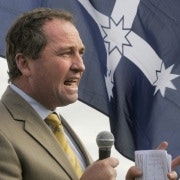An economic message lost in a Rudd-storm
At some point early on in the election campaign, Labor must have opened up the policy cupboards and, shocked at how bare they were, began scrambling to come up with anything that could be portrayed as a positive vision.
That yielded the thought balloon about northern Australia, with tax differentials and irrigation and growth plans, all off in the, in budget terms, distant future. Then there was shifting Garden Island to Brisbane, a proposal with a truly huge price tag, also off in the never-never. That was followed by an announcement to waste actual money – $50 million – on planning for a Sydney-Canberra-Melbourne high-speed rail line, again off in the future. Part of that $50 million will be spent on further Herculean efforts to get the numbers to add up for a project that can't be commercially viable unless you write off the tens of billions in construction costs.
Then there was Prime Minister Kevin Rudd's blatant pitch to economic nationalism last night in expressing his uneasiness about foreign investment. In response to a question that might have come straight from Pauline Hanson, Opposition Leader Tony Abbott did the right thing and said he welcomed foreign investment, while noting the Coalition proposed to keep better track of it. Rudd, however, spotted an opening and went for it. His stab at folksy populism is worth quoting at length:
I'm a bit old-fashioned on these questions and I'm not quite as free market as Tony on this stuff and I'll just explain to you, maybe it's because I grew up on a farm, I'm not sure. I think in the future if I see a good model for how we should develop some of our undeveloped agricultural lands, or some which need a whole lot more investment, I reckon joint venture approaches are much better, where you've got equity in it from farmers, maybe even through farming co-operatives and if you need a whole bunch of capital to develop the land further, domestic investment or some external investment. But I am a bit nervous, a bit anxious, frankly, about simply an open slather on this. So your question is, what would our policy approach be? I am looking very carefully at how this affects the overall balance of ownership in Australia. I'm thinking particularly of our agricultural sector, but the impact in certain cities also of these sorts of acquisitions.
Rudd's anti-foreign investment sentiments might have been delivered without the blunt xenophobia of a Barnaby Joyce or Bob Katter, but it's the same core message. Tony Abbott, who successfully fought off an effort by the Nationals to exploit this issue, was left holding what used to be a consensus between the major parties that foreign investment was to be encouraged (then again, Abbott's walked away from a consensus or two in his time as well).
Maybe this is Rudd's own variant of campaigning in poetry and governing in prose. Campaigning with a fair shake of the sauce bottle and governing with programmatic specificity, perhaps. The high-speed rail boondoggle will never be built. The Navy will remain at Garden Island, drawing on the vast services support network that Australia's largest city provides. No further impediments will be placed in the way of foreign investment. The northern Australian vision will turn out merely to have been a tactic to secure Bob Katter's preferences. It will all have been rhetoric to get re-elected.
But none of it relates clearly to Labor's core election campaign message. Indeed, it's no longer clear what that message is. Initially it was roughly similar to what Julia Gillard's campaign message would have been: about managing economic transition, about education, about health and disability care. It may have been unambitious, but it was a solid foundation because voters at least recognised that Labor had done the work in all three areas. Instead, Rudd and the campaign brainstrust appear to have decided that's not enough to sustain a five-week campaign, and turned to a bunch of balloons to hoist it aloft.
One of the persistent criticisms of Rudd during his first period as PM was his inability to stick to a core message for any sort of extended period. He only did it once, when he tried to make health funding a key issue in 2010. He has visibly failed to do it during this election campaign, preferring instead to shift from one distant vision to the next.
This story first appeared on www.crikey.com.au on August 29. Republished with permission.













